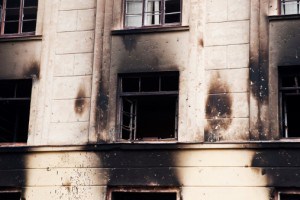Moving Forward After the Fires: What You Should Know about Making a Claim for Soot, Ash or Smoke Damage
 On November 28, 2016, Gatlinburg and the surrounding areas experienced firsthand the devastation of the wildfires. The wildfires that ripped through the Smokies led to the deaths of 12 people, and injured almost 200 more. Close to 18,000 acres burned in two separate locations, and hundreds of people either lost their homes or businesses, or need to do substantial repairs and renovations.
On November 28, 2016, Gatlinburg and the surrounding areas experienced firsthand the devastation of the wildfires. The wildfires that ripped through the Smokies led to the deaths of 12 people, and injured almost 200 more. Close to 18,000 acres burned in two separate locations, and hundreds of people either lost their homes or businesses, or need to do substantial repairs and renovations.
Even those whose homes and businesses were untouched by the fires could have significant damage from the smoke and the soot. Yet many policyholders will face pushback and even denials if they try to recoup losses because of smoke, soot or ash-related damage, especially if the building was untouched by actual flames. But soot and ash can get into places in a building that aren’t quite visible, and make that building unsafe for living or working.
If your policy covers fire, and you wish to bring a claim for fire-related damage, there are a few things you can do to protect your home or business:
- Document everything. Take as many pictures as you can of the damage done to the building and its contents. If, however, the property may be structurally unsound, or if there is a chance that the air could be contaminated and unsafe to breathe, do not go into the building. Ash can be particularly dangerous, as it may harbor burning embers.
- Ask for help from emergency services. Your local law enforcement and fire departments can help you keep your property secure. Not only does your insurer want proof that your belongings were damaged by ash, smoke or soot; you want to ensure that anything valuable within your home is documented by the adjuster.
- Ask your insurance carrier to hire a Certified Industrial Hygienist to test your home or business for remnants of soot, smoke or other contaminants. As a policyholder, you should want to have those tests performed, as they may be the only way to prove just how extensive the damage is. The CIH will take surface samples, but may take air samples as well.
- Work with a professional cleaning crew. You do not want to attempt to clean your own home if it has sustained damage for smoke or soot. We recommended getting a number of estimates before choosing one company.
- Review your claim. If your policy states that your property is to be returned to its pre-loss condition, then your insurer should pay for the costs associated with doing so. You may need to pay out-of-pocket for some costs, so you might want to review your policy with your agent. If it looks as though they may deny your claim, you might want to review it with your lawyer instead.
Many standard insurance policies cover fire damage, but that does not mean your insurer will want to pay. If you believe that your insurance dispute is an act of bad faith by your insurer, you should seek legal counsel immediately.
At McWherter Scott & Bobbitt, we help policyholders who have had their claims denied for unfair or illegal reasons. Our Tennessee insurance dispute attorneys can review your claim, help you document your evidence, and fight on your behalf if your insurer isn’t holding up its end of the bargain. To speak with Brandon McWherter, Clint Scott or Jonathan Bobbitt, or to schedule an appointment at one of our offices in Nashville, Chattanooga, Memphis, Jackson or Knoxville, please call 731-664-1340, or fill out our contact form.

Brandon McWherter has dedicated his practice to assisting insurance policyholders with their claims against insurance companies, including claims for bad faith. He is licensed in Tennessee, Arkansas, and Mississippi. Learn More
